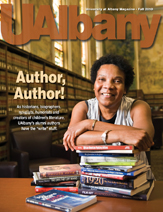
Darby Penney, M.L.S.’80
Human-Rights Advocate
By Amy Halloran, B.A.’90
hile employed by the New York State Office of Mental Health, Darby Penney happened upon material that led to The Lives They Left Behind: Suitcases From a State Hospital Attic (Bellevue Literary Press, 2008), written with Dr. Peter Stastny, psychiatrist and filmmaker.
A leader in the human-rights movement for people with psychiatric disabilities, Penney discovered the suitcases referred to when Willard State Hospital closed in 1995. Saved by staff members and a curator from the New York State Museum, these 400 suitcases held the possessions of people who had been institutionalized.

Penney and Stastny worked with photographer Lisa Rinzler to examine the artifacts of these people’s lives, and to curate an exhibit that shared this historical bounty with the public. The New York State Museum presented the exhibit in 2004; a portable exhibit is still circulating. The Web site www.suitcaseexhibit.org offers a virtual tour of the project.
Penney credits her time at UAlbany with helping her to develop the research skills she needed for the project.
“Everything I ever learned about how to use a library, I learned from the late Professor [of Information Science] William Katz. He was a great teacher. People often think of library research as being kind of dull, but he made it engaging,” said Penney. “I did some independent study work in the mental health field with Professor [and later Dean of the School of Information Science and Policy] Richard Halsey, and learned how to mine government documents and archives. That was essential for the book, because I spent an awful lot of research time in the New York State Archives.”


Michael Rinella, Ph.D.’97, has published Pharmakon: Plato, Drug Culture, and Identity in Ancient Athens. Pharmakon examines the emerging concern for controlling states of psychological ecstasy in the history of western thought, focusing on ancient Greece. Employing a diverse array of materials ranging from literature, philosophy, medicine, botany, pharmacology, religion, magic, and law, Rinella fundamentally reframes the conceptual context of how we read and interpret Plato's dialogues. Accessible to the general reader, yet challenging to the specialist, Pharmakon is a comprehensive examination of the place of drugs in ancient thought that will compel the reader to understand Plato in a new way.




